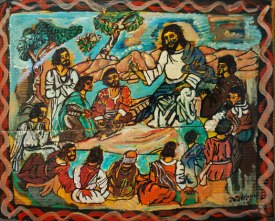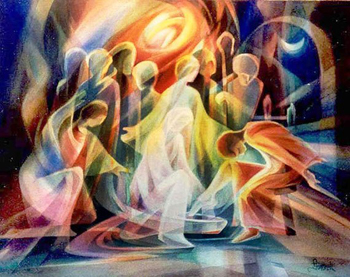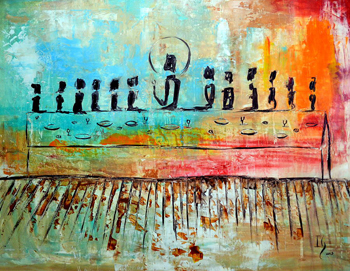For Sunday September 26, 2021
Lectionary Readings (Revised Common Lectionary, Year B)
Numbers 11:4-6, 10-16, 24-29
Psalm 19:7-14
James 5:13-20
Mark 9:38-50
Most of us have seen (stereotypical) examples of bouncers in movies or television shows. Mention the word, and we immediately conjure up powerful, six-foot-tall bodybuilders with black armbands, steel-toed boots, and menacing expressions on their faces, grimly guarding the entrances of bars or nightclubs.
Whether or not the physical description fits, a bouncer’s job is to provide security, keep order, refuse entry to people who aren’t allowed inside, and “bounce” (throw out) those who forfeit their welcome. In a broader sense, a bouncer’s job is to serve as a gatekeeper for the institution he or she serves. Who is an insider and who is an intruder? Who deserves entry, and who is best left outside in the alley for the good of the venue?
Our lectionary this week offers us two stories of zealous, would-be “bouncers.” In our reading from Numbers, God commissions seventy elders to help an exhausted and overburdened Moses lead the Israelites. When God invites the elders to gather at the tent of meeting for further instruction, sixty-eight men obey, but the remaining two (Eldad and Medad) stay behind in the camp. Still, when God sends his spirit to rest upon the elders, causing them to prophesy, Eldad and Medad prophesy, too.
When Joshua, Moses’s young assistant, hears this unexpected news, he kicks into bouncer mode immediately: “My lord Moses, stop them!”
But Moses replies with a wonderful combination of incredulity, wistfulness, and amusement: “Are you jealous for my sake? Would that all of the Lord’s people were prophets, and that the Lord would put his spirit on them!”
 |
Likewise, in our Gospel reading, the disciples notice “someone” casting demons out in Jesus’s name, and just like their spiritual ancestor, Joshua, they respond by donning their bouncer armbands and barring the doors: “Teacher, we tried to stop him, because he was not following us.”
Unsurprisingly, Jesus sees no reason for concern: “Do not stop him; for no one who does a deed of power in my name will be able soon afterward to speak evil of me. Whoever is not against us is for us."
As I reflect on these two stories, I’m reminded that our penchant for spiritual gatekeeping has a long history. I’m also reminded that God has to spend a lot of time throwing open the doors we run around closing. How ironic that we feel more zealous about the borders of God’s kingdom than God does!
Why is this? Why do we human beings find such satisfaction in fancying ourselves God’s bouncers? What is it about us, that we feel accomplished, successful, and even “spiritual” when we secure someone else’s failure? Why do we Christians place so many stumbling blocks in the paths of those who seek God in ways we don’t immediately recognize? Why are we so much better at noticing and judging differences than we are at seeing and celebrating commonalities?
The tricky thing about the readings this week is that both Joshua’s and the disciples’ motivation in these stories is good. They’re not hateful people; they’re well-intentioned people who want to honor and protect the sacred. Joshua is accustomed to seeing and experiencing God’s presence at the tent of meeting. He’s used to having Moses nearby to mediate such holy encounters. What can it mean if the divine spirit is suddenly showing up in the camp? Away from the tent? Away from Moses? Among men who don’t follow the rules? Won’t such lapses in propriety and etiquette end in chaos? What if the spirit keeps showing up in odd, unexpected places? What will happen then?
 |
In the same way, the disciples balk at an outsider exorcising demons in Jesus’s name. Never mind that the fellow is out there doing good. Never mind that he’s alleviating suffering, healing brokenness, restoring people to community, and trusting in the name of Jesus to provide powerful and necessary healing. The problem remains that he’s not doing any of these things in the right way. He’s doing it differently, out on the margins, away from where the disciples might wield appropriate influence and control over his work. (“He’s not following us.”) What if this outsider gets the whole religion thing wrong? What if he doesn’t say the right words in the right order? What if his unorthodox relationship with Jesus gains a following and forces the disciples themselves to (shudder) change?
Neither Moses nor Jesus give these “what ifs?” much credence. Moses responds as a man who has walked with God long enough to know that God doesn’t need human beings to protect his interests. God’s spirit is perfectly capable of taking care of herself, and she will blow where she wills, how she wills, and when she wills — our anxious and self-protective pieties notwithstanding.
As for Jesus, he is far too focused on what really matters — the culmination of his ministry on the cross — to waste time on gatekeeping. By this point in Mark’s Gospel, Jesus is speaking openly and frequently about his impending death. And it’s not just talk — he’s also making his way south towards Jerusalem, away from safety and towards crucifixion. He knows he’s running out of time. He knows he has mere days left to prepare his still clueless disciples for what’s coming.
So he ramps things up. We can feel it in the lectionary, in Jesus's growing sense of urgency, frustration, and impatience. “PAY ATTENTION TO WHAT’S IMPORTANT!” he seems to be pleading. “Faith is hard! So much is at stake! What you say and do, what you focus on, what you prioritize as my disciples — these things matter! So look at the stumbling blocks you place in front of yourselves and each other. Look at the perverse pleasure you take in excluding people who live, believe, worship, serve, and practice differently than you do. Look at how smug and superior you feel when your brothers and sisters fail. Look at how insecure and tenuous your own faith must be, if its survival depends on your dismantling someone else’s. Stop being stumbling blocks. Stop being bouncers. Stop making faith harder for yourselves and for others than it already is.”
 |
The longer I’m a Christian, the more overwhelmed I am by the radical nature of Jesus’s openness, inclusivity, and hospitality. Every time I think I’ve made my circle wide enough, Jesus says, “No, make it wider.” Every time I think I’ve drawn an appropriate line in the sand between “us” and “them,” saint and sinner, inside and outside, Jesus pours the sand back over the line until it disappears. “Whoever is not against us is for us.” What an amazing declaration. Whoever doesn’t oppose the beautiful and salvific works of God — mercy, love, kindness, justice, liberation, peacemaking, healing, nurturing — is on Jesus’s side, and our work is to welcome them, host them, include them, and love them. How mind-blowing is that? How challenging for us Christians who love our institutional, denominational, doctrinal, and socio-cultural cliques so very, very much.
I know that some of the language in this week’s Gospel reading seems harsh and unforgiving. It’s not easy to read Jesus’s words about millstones, missing limbs, and unquenchable fire without flinching. But I believe we do ourselves and each other a disservice if we assume that Jesus means to condemn us with this language. I don’t think this passage is about condemnation; it’s about reality. It’s about what we human beings do. We exclude. We judge. We condemn. We compare. Too often, we designate ourselves God’s bouncers.
But the truth is, we are called to be God’s generous and welcoming hosts. Hosts who throw the doors of the kingdom wide open. Hosts who understand that there’s enough divine goodness, mercy, and justice to go around. Hosts who trust that God can handle our diversity — and delight in it as well. Hosts who respond with joy and gratitude whenever “deeds of power” are done in Jesus’s name. Hosts who, like Moses, long for the day when “all the Lord’s people” will be filled to overflowing with the spirit of God.
Whoever is not against us is for us. If Jesus himself has declared this, then what are we doing? Whose boundaries are we protecting? Why are we still outside in the alley, guarding the doors?
Debie Thomas: debie.thomas1@gmail.com
Image credits: (1) First Baptist Church, Greensboro, NC; (2) "A Refusal To Be Jesus To Others," Light of Truth blog, India; and (3) Fine Art America.



